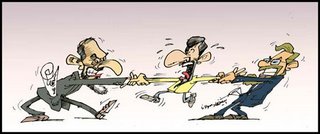
Studying reactions to the package offered by EU and USA to Iran reveals the diversity of individuals’ motives and incentives. Head of Iran’s Civil Aviation Organization had many reasons to celebrate when he revealed to reporters that the ban on purchasing commercial airplanes and parts would be lifted. His organization and Iran’s national flag career, Iran Air, and several private commercial companies have been suffering from sanctions for too long of a period. Iran’s commercial fleet is aging and passengers are not thrilled about flying with Russian TU-154’s. Iran’s few economists have reasons of their own to keep their fingers crossed. Iran’s joining WTO would open so many doors to private sector that a sustainable growth path might be guaranteed. However aviators and economists constitute but a minority and a very small minority for that in Iran.
Speaking of a majority promising American technology for agriculture is the most exciting one. Offering to lift sanctions on this sector is a promise that cannot be ignored by many. Iran’s soaring unemployed population is in need of jobs and such development could provide entrepreneurs with many opportunities to invest in a labor intensive sector. Unlike aviation, unemployment has become a high priority and a national security concern for many statesmen in Tehran. Here they might have an incentive and personal motive to consider the package more closely. And unlike aviators statesmen have influence.
At the end of the day the main question is if the package is interesting enough for those influential ones to be accepted. Despite popular belief, Iran domestic politics is hardly a one man’s show. A closer look reveals that there are a number of groups affecting the final decision with different levels of influence. These groups include a few unofficial politicians clubs, interest groups, industrialists, some workers unions and economic foundations.
While reformers, technocrats, moderators and traditional conservatives would welcome any reconciliation, the ultra radicals might find it inconvenient to be accused of comprising national interests by their rivals and to lose their excuse to get rid of these rivals. However they could claim the credit and that is a remarkable gain in domestic politics guaranteeing more victories in future elections.
Interest groups are more divided. Those formed by merchants and service sector entrepreneurs would be more excited about such packages than those formed by the directors of import substitution programs and monopolist manufacturers of commodities fully protected by the government bans on imports of substitutable products. The prospects of losing domestic markets and profits to foreign competition have never been exciting to them. They could mount a serious barrier. One sould remember that they could benefit from social muscles of their hundreds middle class stockholders and workers unions. Joining WTO for these industrialists is a death sentence, which they will resist strongly. There is not much for them in the package, unless a promise of investments for upgrading their technology could be added.
The list is not complete without mentioning the contractors of public projects and organizations who actively are seeking multi billion dollars contracts. They certainly would not welcome any competition in the market as well. But they also offer a genuine opportunity for rapprochement. Investments that allow them to purchase equipments and to improve their services would encourage their beneficiaries to become adherent supporters of such developments. This could make any positive development regarding nuclear program sustainable.
It is too soon to guess who is for and who is against the package in Tehran and who needs something more. Presently it seems package could use a few more incentives for interest groups involved in the decision making process in Iran. It is certainly a step ahead of previous offers, which were more symbolic than pragmatic. For the first time, the offer comes with the guarantee that USA would join the table. The man, who could benefit from this opportunity, would be remembered as the one who saved Iran from the great Satan. That would be quite a remarkable reputation; a historically magnificent one. And in Iran, history is still important for many.
* cartoon is Nikahang's nikahang.blogspot.com on the left it is Mr. Shariatmadari the editorof Keyhan, a daily paper in Tehran well known for its radical stand and on the right there is Dr. Larijani Iran's chief negotiator and the head of National Security Council.
No comments:
Post a Comment